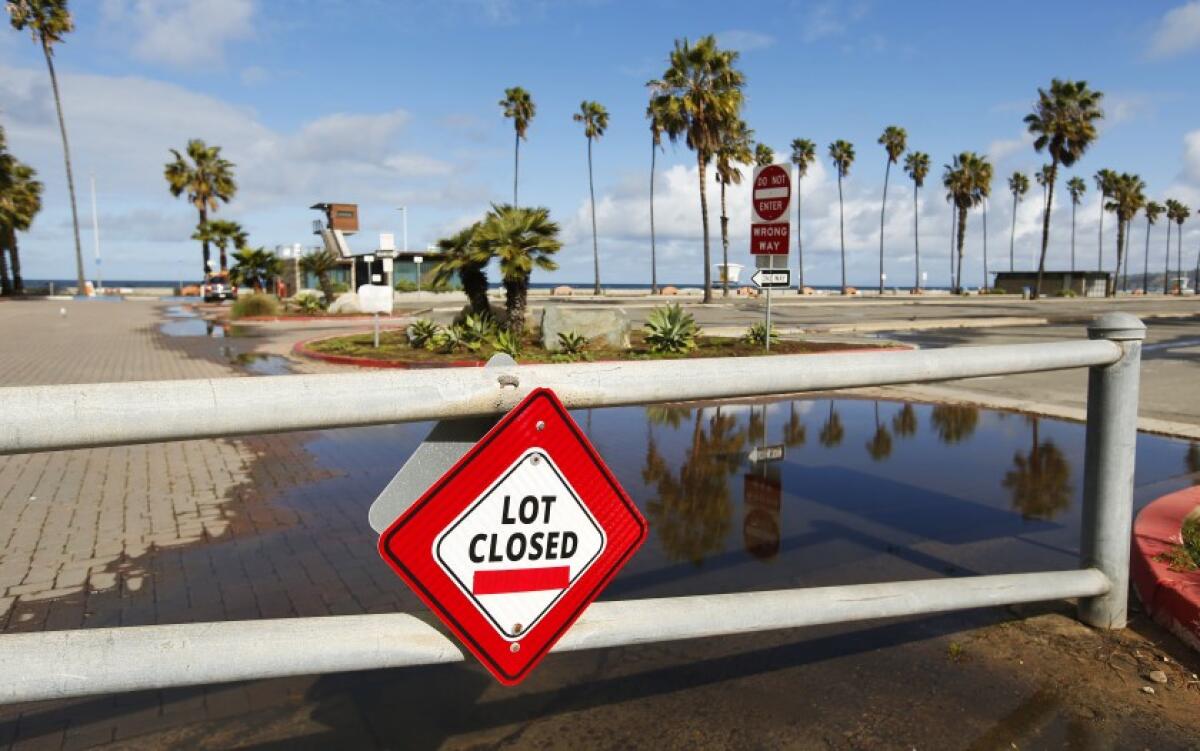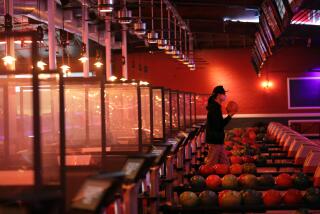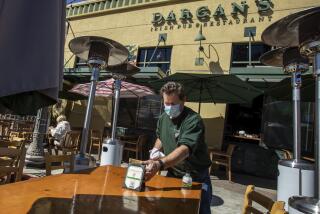San Diego to reopen neighborhood parks as promising signs emerge in COVID-19 fight

- Share via
SAN DIEGO — After weeks of canceled events, closed businesses, roped-off recreation areas and orders to stay inside, San Diego residents heard some encouraging news: Neighborhood parks in the city would reopen with restrictions on Tuesday.
“There is a light at the end of the tunnel,” San Diego Mayor Kevin Faulconer said Monday afternoon in announcing that neighborhood parks would reopen in the city the following day.
“We’ve come a long way in five weeks,” he said, thanking residents for following orders and recommendations that have turned life upside down for many people, but are credited with heading off a surge of patients in hospitals as COVID-19 has spread throughout the county.
Faulconer said he had spoken with mayors of other coastal cities to discuss a safe, phased and coordinated approach to opening some sort of water access.
“Our cities will be prepared to open beaches and the bays as soon as the county authorizes the water access, which could be by the end of the month,” he said.
Earlier in the day, county officials said they also are considering some baby steps in reopening some closed facilities and allowing certain activities. Supervisor Nathan Fletcher said golf courses might reopen, some water recreation such as surfing could be allowed and parking lots at parks and beaches might be reopened, but only to half-capacity.
County Health Officer Wilma Wooten had ordered bars to close and restaurants to serve only take-out on March 16 in response to the pandemic. A string of other county and city orders followed, including the closure of all beaches. The state has set which businesses are considered essential and can remain open.
Individual cities were allowed to decide whether to close their parks, but the county closed all parking lots adjacent to them to restrict access to only local residents.
Faulconer said there still will be many restrictions on neighborhood parks when they reopen. Those include a prohibition on public gatherings or active sports such as basketball. Playgrounds and parking lots will remain closed, and people are encouraged to wear facial coverings.
They can, however, do individual recreation such as walking or jogging, he said. A list of which parks are open will be available online Tuesday.
“We are absolutely entering a new phase of this crisis,” Faulconer said.
The encouraging news from the city and county came following some positive trends in the number of new cases and hospitalizations in the county, but also at a time when there are signs of growing impatience with the orders.
Coronado Mayor Richard Bailey has called the county’s orders an abuse of power that threaten to erode the public’s trust and compliance.
Supervisor Kristin Gaspar on Monday requested the county remove restrictions on swimming, surfing, paddle boarding, and recreational boating to allow local jurisdictions to make decisions on what recreation could be allowed in their areas, and she shared a proposed safety plan aimed at helping the county safely lift restrictions on golf courses.
A protest calling for the county and city to lift restrictions was held in downtown San Diego on Saturday and another was held in Encinitas on Sunday.
No people were cited for violating the county’s orders against public gathering, and San Diego County Sheriff’s Department Media Relations Director Lt. Ricardo Lopez issued a statement Monday that said deputies and police were balancing public safety with the right to protest in making the decision.
Violators of the county order, however, may not be off the hook.
“Although the protests were allowed to take place, we must not forget the public health orders were put in place to protect our communities from the spread of COVID-19,” he wrote. “While no citations were issued at the protests, that does not mean prosecution will not be sought, especially to the organizers of these events.”
Wooten also said the county would be tracking new positive cases of COVID-19 to see if they could be traced to the protests.
Addressing when the county would dial back some restrictions, Wooten said all decisions would be data-driven and follow six indicators from the federal government, which include benchmarks for symptoms, cases and hospitalizations.
One criteria is an overall downward trend of the percent of tests that are positive among tests conducted over 14 days. While that number has gone up and down slightly in that time, it has shown a downward trajectory from 7.1% to 6.9% as of Sunday, according to a chart she showed.
Another downward trajectory was of hospitalizations over 14 days. New hospitalizations over 14 days had a high of 38 and a low of five, but did show a downward trend from 27 to 10 as of Sunday.
Another federal benchmark calls for jurisdictions to have a robust testing program in place for at-risk health care workers, including emerging antibody testing.
Fletcher said the county still has to develop a plan for testing, tracing and isolation.
“We still don’t have enough testing capacity to determine how many people are sick, to track every single person they’ve come into contact with or require isolation of anyone who’s tested positive,” he said.
Wooten reported Monday that there have been 2,325 positive cases in San Diego County, or 57 more than the day before, and 72 deaths, with a woman in her mid-80s the most-recent.
Addressing when the county and local jurisdictions can begin to scale back restrictions, Fletcher said cities should begin working on their own plans for reopening parks and trails for active use.
He also cautioned against moving too quickly, because the county could quickly lose ground it’s made with social distancing, closures and other orders.
“There are some out there calling for an immediate return to normal, right now, because our cases are low,” he said. “But to paraphrase an analogy from a Supreme Court justice, that would be like throwing away your umbrella in the middle of a rainstorm because you haven’t been getting wet.”
While talk progresses about what restrictions may be lifted, one more summer event was canceled on Monday with the announcement that the July 4 Lake Murray Fireworks & MusicFest would not be held.
The music fest has been held at Lake Murray Community Park in San Carlos for several years, with fireworks over the lake that can be seen throughout the Navajo community, from La Mesa to Del Cerro and Allied Gardens and beyond. Lake Murray’s gates have been closed to walkers, boaters and park visitors since mid-March.
Also on Monday, 1,000 bottles of hand sanitizer donated by the motor oil and lubricants company RPP Products were distributed at a temporary homeless shelter at the San Diego Convention Center.
The company pivoted its operations and began making hand sanitizer after the COVID-19 crisis began.
City Councilman Chris Ward and Gaspar were scheduled to help distribute the bottles containing 250 gallons of hand sanitizer Monday morning.
Warth writes for the San Diego Union-Tribune. SDUT writers Karen Pearlman and Karen Kucher contributed to this report.
More to Read
Sign up for Essential California
The most important California stories and recommendations in your inbox every morning.
You may occasionally receive promotional content from the Los Angeles Times.















